|
Here’s our re-designed general brochure! Feel free to print! You can download it here: Brochure-1211 – g If you’re interested in using our brochures, we’d love for you to let us know how it went – and for you to get more involved! Email us at [email protected]!
Recently, an admin from LGBTQ+ of FIRST interviewed Tim’m West about LGBTQ+ representation and education in schools. Here’s what he had to say:
Please give a short introduction for people who may not know you. My name is Tim’m West; professionally and formally I lead Teach For America’s LGBTQ Community initiative. I am a longtime educator, youth advocate, and on the side I do some poetry and hip hop. What brought you to LGBTQ+ activism? I think namely my own personal experience. I grew up a queer kid in the 80’s in southwest Arkansas, and, for me, there weren’t positive queer role models. The only mentions of LGBTQ were negative. For me, the dearth of mirrors to see myself, the absence of LGBTQ people made a difference in how I saw myself. It made me want to teach. I felt that as a teacher I could contribute to making schools a space where students did see you and see that a black queer accomplished man existed and feel you are pretty awesome for that truth. Beyond teaching, that was really important work to do where representation is concerned. I went to school to study philosophy. I thought I would be a college professor, but I ended up leaving my PhD program, and I had two Masters degrees in rather obscure humanities areas, if at good institutions (The New School, Stanford). I got a job running an English department in a high school, so I fell into teaching youth and supporting their academic and social emotional development. Being around youth and understanding their challenges encouraged me to be a better example for them by bringing myself more fully into educational spaces. I have done that in schools as a man who is queer, and I have done that in schools as a man who is HIV positive, which sometimes leads to pushback like, “ooh students don’t need to know that about your personal life”. Still, I’ve taught in places that have high HIV incidence and prevalence. I’d be remiss not to share my own personal experience with them as a way of motivating sexual and emotional safety. What do you see as being the value of LGBTQ+ representation in schools in terms of the teachers? There’s been a lot of data [on the effects of representation], though not a lot of it has been done on the LGBTQ community. For example, in the African American community—and I can say this as an African American who had maybe one African American male teacher in all my schooling—it affected me to not seeing myself represented among the people who are teaching. There have been recent studies that show that students who see themselves represented do better. It’s connected to the reality that less than 2% of teachers in the US are African American men. Yet we know the representation of black boys in public schools is far higher. It actually just creates a situation where people who might be able to best connect and reach students aren’t present. Ultimately, it’s not to say a student can’t learn from anybody, but I think identity and how people see themselves is shaped by those who teach them. So if you’re LGBTQ and you don’t see any teachers or administrators identify that way, it sends a message, an implicit message that you LGBTQ people don’t belong in the places entrusted with our learning; or that if they exist in that space, they’d better be quiet about it. I think connotes a problematic idea of shame; that being LGBTQ is not something that you should be proud of. Being out as a queer teacher is not about the material being any different. What harm is there in knowing that a science or history teacher might be LGBTQ just as we know or assume our teachers are straight? One’s orientation might actually inform something unique about their approaches to teaching or world view. I think that’s important for students to see and experience. How can LGBTQ+ lessons be integrated into the classroom? I have an interesting belief in this, because I don’t believe that LGBTQ issues should be brought into the class independent of the need for rigorous content. By having an LGBTQ lesson, you’re tokenizing our identity as opposed to normalizing our identity. Why, if you’re talking about quantum physics, and let’s just say an important person in that field happens to be LGBTQ, is it a bad thing to mention that in the context of their innovation? It might be interesting for people to know that. If you’re looking at biology for example, why can’t there be discussions about gender or intersex people, or the myth that XX and XY pairings are the only and there isn’t biological and chromosomal diversity beyond that? It’s just bad science. There are ways to talk about LGBTQ issues and ideas that are not tokenistic. Content and culture can enable strong learning and aren’t oppositional. We don’t have to say: “let’s take a break from our real work and talk about LGBTQ people”. I’d say the same thing about exposure to different cultures; it’s not helpful to say: “let’s talk about black people for 10 minutes”. What are the major roadblocks to LGBTQ+ education in schools? I think you have different generations of people that haven’t had the exposure. Often, what I find in schools is that it’s not predominantly students who are creating difficult challenges for queer and transgender kids, it’s the teachers who have been there forever who refuse to divorce their personal biases from their teaching. A good example of that is when I taught rhetoric at a conservative school in suburban Texas, and I had to help students write anti-gay marriage papers. Did I like to do that? No. But it was my job as a teacher to help them question their beliefs and, sometimes, help them craft as strong an argument as possible against something I felt strongly about. It’s not my job to convince my students to believe the way I do. It is my job to create a safe arena for the development and maturation of students’ opinions and thoughts. The role of a strong teacher in school is to create that setting and environment. Unfortunately, according to the data we see, LGBTQ students are not safe in high schools. They face a lot more harassment, they drop out at higher rates, truancy rates are higher, any number of indicators. How can non-LGBTQ+ teachers be good allies? I think one not to hypervisibilize LGBT students by treating them different that others, but to truly be committed to creating a classroom environment where ALL students feel like they have something to contribute to the class. Some of that is about intentionality and exposure. In your curriculum, is there something that can speak to the diverse background and experiences in class? Teachers who do that really well are really appreciated by students. It’s like, “oh wow — this is not just about the specific academic topic, but we’re also learning about ourselves and the people around us.” It’s important for student development. Otherwise, teachers should be good allies to queer and trans kids because it’s their job (that’s the smart-ass answer). It’s not about whether or not you want to support LGBTQ students. As a teacher, should be fully committed to the education of your students. Truly being committed means that you advance a classroom culture where anti-LGBTQ microagressions aren’t tolerated; where all students feel safe in your class and not harassed, because that can ultimately impact their ability to learn well. Students feeling safe to learn, or not, is a reflection on you as a teacher. There’s lots of discussion surrounding the use of labels, especially in the aro and ace communities. This is my experience and opinion on how they are best applied. I use the split attraction model, which divides attraction into sexual and romantic.
My first step on the road to realizing I’m aro/ace (aromantic/asexual) was accepting my asexuality, although I still thought I was heteroromantic. This immediately required an acceptance of the split attraction model that I still believe in. Later on, I started to reconsider my “crushes” and found that they had different circumstances than most people’s. This led me to look further into the various descriptors of romantic attraction. While I didn’t try each of these, the list includes things like fray-, akoi-, quoi-, demi-, and autochoris-. The list goes on and on. Some might call these silly, splitting hairs, or an attempt to be a special snowflake. I ended up using aro/ace, a more accepted one. But I don’t think I would’ve gotten there as soon without looking into these labels. They helped me see that there’s more ways to experience attraction than whatever your friends feel or what the media shows you. Labels in general are descriptions of an experience, not the other way around. Each person’s experiences are unique and likely aren’t shared exactly by anyone else. In my opinion this means labels are only useful to figure out what you are experiencing if they lead you to find resources. They are not rules on how you are supposed to feel. For example, I’ve tried dating since figuring out my current set of labels because I wanted to be close to someone, who happened to have a crush on me. It didn’t work out because of my orientation, but it was definitely worth the try, and I would have missed out on it if I had stuck to my labels. However, labels are very helpful to find a network. Sometimes you need support, advice, or just a person to talk to who understands what you mean. It’s a lot easier to say the closest approximation to what you feel rather than describing it every time. When it comes to interactions, labels should only be used to self-describe. It’s good to understand yourself, but nobody else should try to dictate how you identify yourself. They only need to know how you feel about them. To the aforementioned person, I told her I’m aro/ace, but when we talked about our relationship, I never used a label. It’s important to be honest and leave nothing out when doing this, but it leads to better relationships than simply using someone else’s experiences to describe yourself. Whatever labels you choose to use, remember that who you are is more important than what you are. You love who you love how you love, and how you describe that is entirely up to you. – Cate S. As we enter week three of build season, the stress is probably starting to climb and teams should be well on their way to making a functional robot. By now freshmen should be introduced to the craziness that is FRC, and upperclassmen are probably hard at work or arguing over design ideas for the umpteenth time this week. Robotics teams are, in my experience, like a huge dysfunctional family. FIRST robotics is made up of a very diverse group of people, all coming together to build amazing robots. As much as some individuals like to poke fun at The Straights™ here on tumblr, they’re still going to be your teammates. All joking aside, you’re still going have to deal with, and respect hetero/cis people on your team. In order for a team to be functional, everyone has to respect each other equally. Here are some ideas to keep in mind when dealing with those who are not LGBTQ+ on your team.
- Kira K. 5683 anonymous asked:
Hey I'm from 1796 and I don't know if I should come out to my team or not I've been trying decide for a awhile, any advice? Firstly: I recommend against coming out if you feel like it will put you in an unsafe situation. Your own safety should come first. Secondly: It’s often a good idea to come out to one person or a small group of people first, to test the waters, before coming out to the group as a whole. Depending on your situation, you may not even need to come out to the group all at once. Thirdly: Pick the right time to come out. In the middle of build season, when tensions are high and stress is rampant, may not be the best time to tell someone something this important. If you want more of our advice, you can check out our #coming out tag! Best of luck! -Aryn 4982 Every year, we all get to experience the joys of build season. The excitement at creating robots becomes the backdrop of daily life from January all through February, during times in High School when midterm exams and 3rd Quarter Projects are important. However, during Build Season there is a key aspect to keep in mind. Something that doesn’t often get discussed.
Flu Season. Yes, I get to stand on my metaphorical pedestal and teach you all how to handle getting sick during build season. Now, the most common thing for people on the team to catch is a cold; with everyone in such a confined space, something as simple as a cold can wipe out and exhaust a decently large chunk of your workforce and remove a valuable chunk of time from your build season (I have personally experienced this and I can tell you it is Not A Fun Time). So, what do you do if you get sick during build season? DO:
DON’T:
Overall, it’s very important to take care of your health during Build Season. As much as I know there will be That One Kid who goes to a build meeting while sick, you don’t have to be that kid. You’re a responsible FIRST-er who knows how to build robots from the ground up, coding and/or physical build wise, and your team is counting on you. You have the freedom and the smarts to know not to risk accidentally getting the rest of your team sick with FIRST-itis (which, contrary to my mentor’s beliefs, is nowhere near as bad as LARP-itis) and can keep yourself and others healthy. Remember: If all else fails, wash your hands. There’s a lot of germs in a lot of places; the best way to keep yourself healthy is to prevent yourself from getting sick from the get-go. The discussion of politics sometimes feels somewhat like defense being played - a little like the gif above. On my team, politics is an unavoidable and often amusing discussion. Usually, it consists of Ronald Reagan fanboys regaling a time they never experienced and awkward posturing regarding topics such as “guns don’t kill people, people kill people.” Sometimes, the topics become absurd, such as why the US should have Brazil as a primary ally during World War Three (we shouldn’t).
With the current political atmosphere, politics is as divisive as ever, and coming from team with a lot of political opinions, navigating that can be complicated. The obvious answer is: avoid it! However, what’s the fun in that? Sometimes, talking politics (and even religion) can be an entertaining use of time as the build season hours get longer and longer. Firstly, be civil. Whether or not there’s consensus on a subject isn’t an excuse to lose your temper or your humanity. While politics may be interesting to talk about, it’s not an excuse to throw punches. Additionally, if you have another team member purposely being antagonistic, don’t take the bait. There’s no reason to take the low road. If you think the discussion could lead into a fight, don’t begin the discussion. Admit when you’re wrong! This one goes whether or not you’re talking about politics, especially when regarding misinformation. You can definitely learn something new when talking to someone about issues that really matter to them, and make sure you keep phrases like, “I hadn’t thought of it like that,” in your arsenal. There’s always more to learn! Be compassionate! Many people are personally affected by political issues which leads to differing views on the subject. Everyone has reasons for why they believe the things they do. Of course, if someone is diminishing your humanity, there’s no reason for this, but make sure to have empathy when discussing something controversial. Know when to walk away! Whether it’s just not the right time for politics in the shop or you can’t personally handle it - that’s OK! After all, there is a robot to build! Being cramped together with your team isn’t always a fun experience, but take the opportunity to learn from others and make sure that they learn from you too. -Kiran L. 2826 The clocks are ticking; there’s only two more days until Kickoff! There’s a lot to think about during this time, such as designing and building a robot, writing code, finishing Chairman’s essays, preparing scouting systems, the list goes on and on. Last, but certainly not least, comes dating.
Dating is always tricky, but it can be even more difficult during build season. It’s hard finding time around robotics to balance homework, self-care, jobs, and relationships. As an LGBT+ student, all these factors and more come into play. By dating, you might risk outing yourself or others; and accidentally creating drama on the team if relations are not kept business-like and graciously professional. Hopefully after reading this, maneuvering the robotics dating field will be much easier!
Dating is always complicated, but if you handle it maturely, your relationship can survive the stress of build and competition season. Good luck to all teams as you take on FIRST Steamworks! -August S. 2194 Three more days until kickoff! You know what this means: pizza, caffeine, and no sleep for 42 days.
However, despite all the jokes we all make about awful diets and bad sleep habits, self-care is something we all need to remember during build season. Here are some tips to stay healthy as we approach a time when our health often, unfortunately, ends up as a low priority.
Good luck, and remember: safety and your health come FIRST. -Errica 1073 With build season quickly approaching it’s normal to be a little nervous about spending 6 weeks in close quarters with the same people. For an enjoyable build experience, getting along with your teammates is key. Whether you are best friends with your teammates or aren’t friends at all, here are some helpful tips for surviving build season with all your bridges intact.
Good luck to all teams! We hope everyone has an amazing season! – Gus D. 3940 |
About LGBTQ+ of FIRST
LGBTQ+ of FIRST is a student run organization that advocates awareness and acceptance of LGBTQ+ students, mentors, and volunteers of FIRST Robotics. LGBTQ+ of FIRST reaches out to over 1000 members across the FIRST regions and fronts multiple outreach endeavors. Archives
June 2024
Categories
All
|

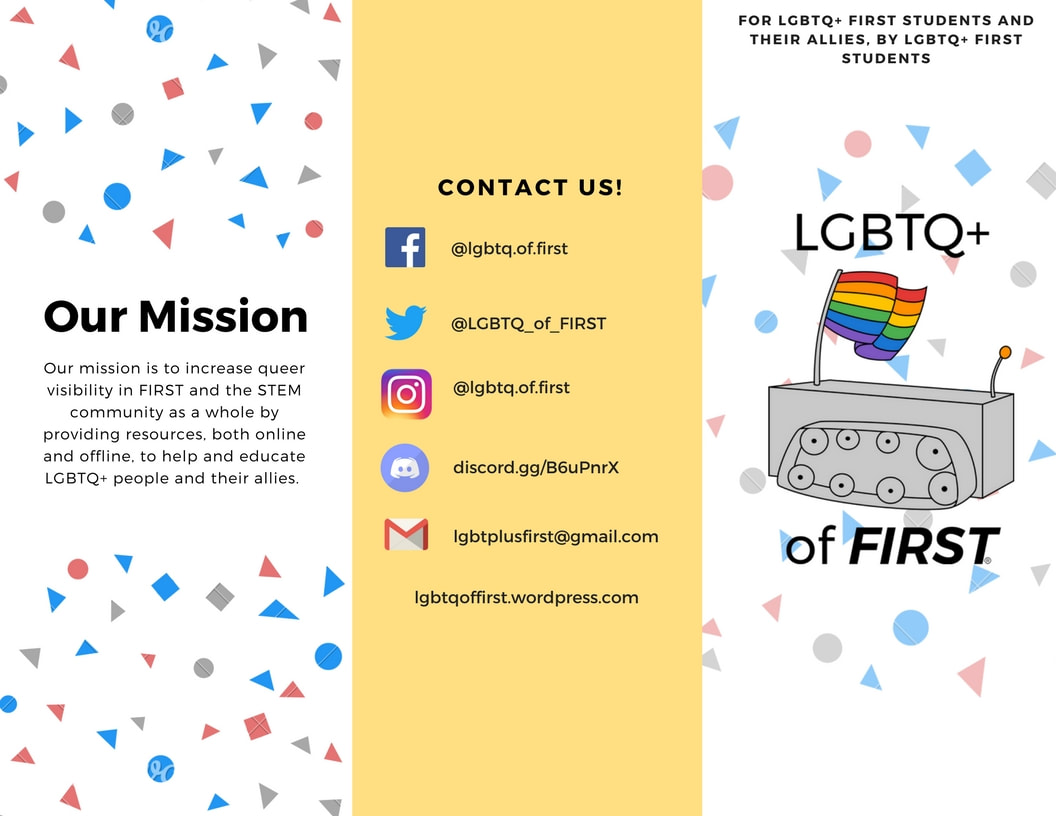
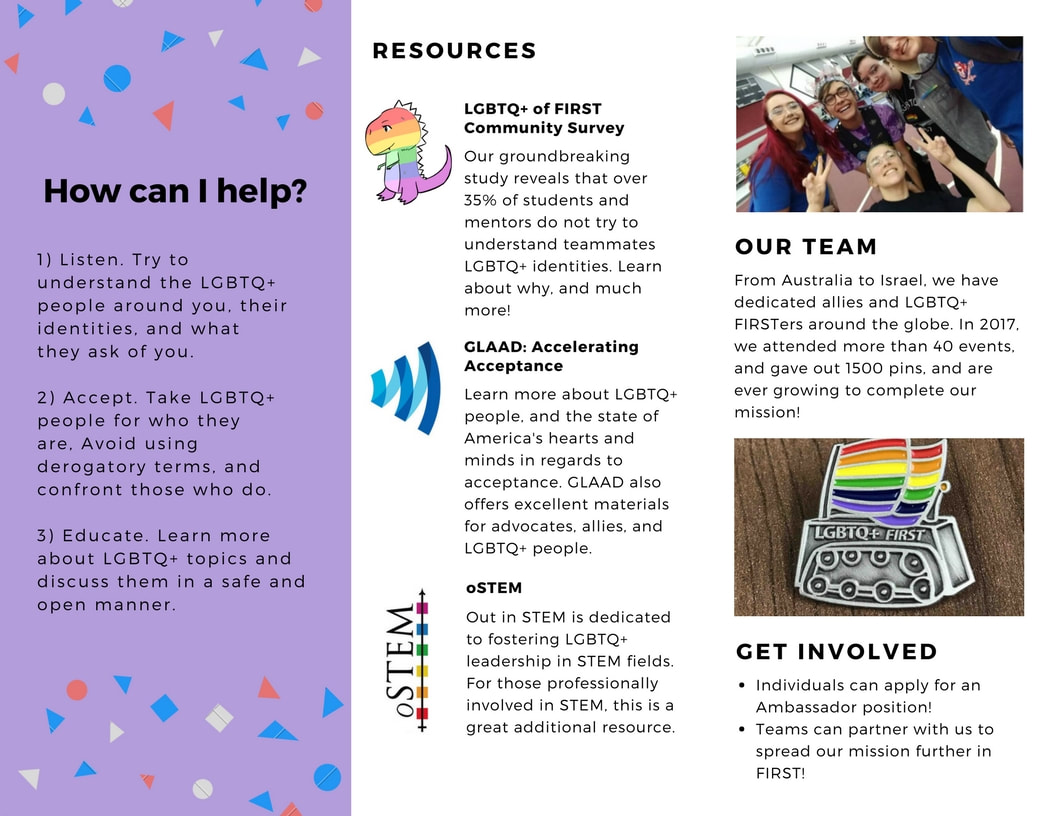
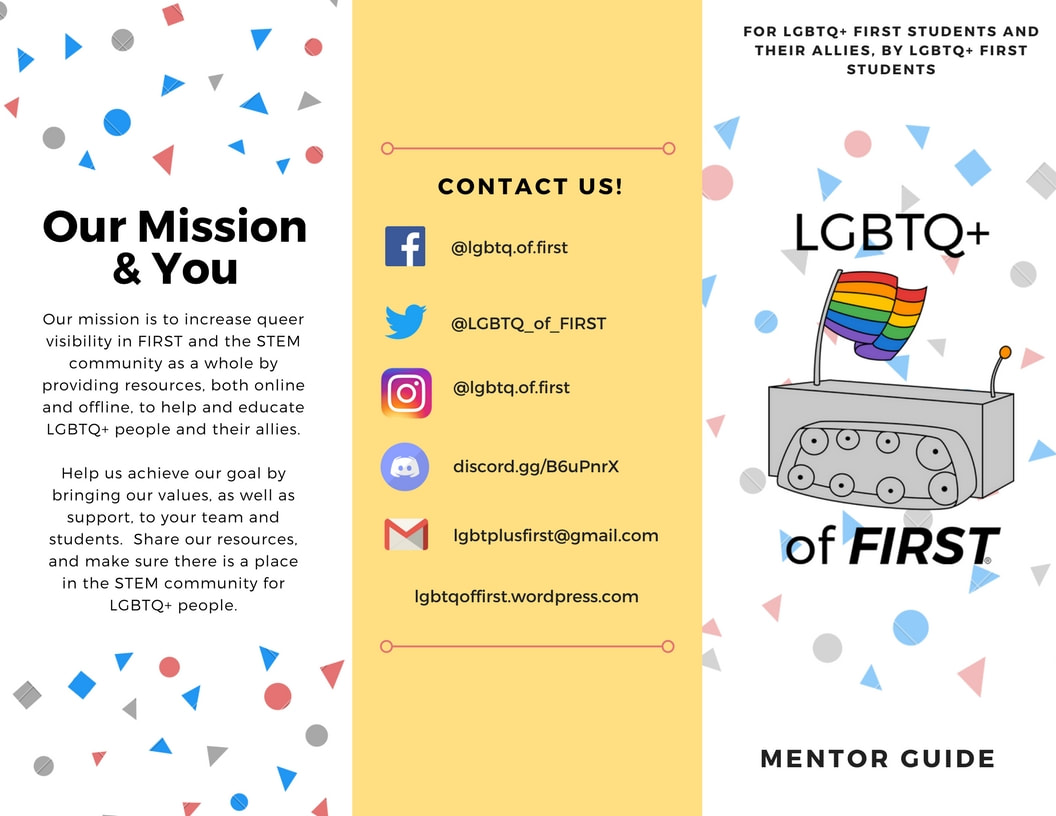
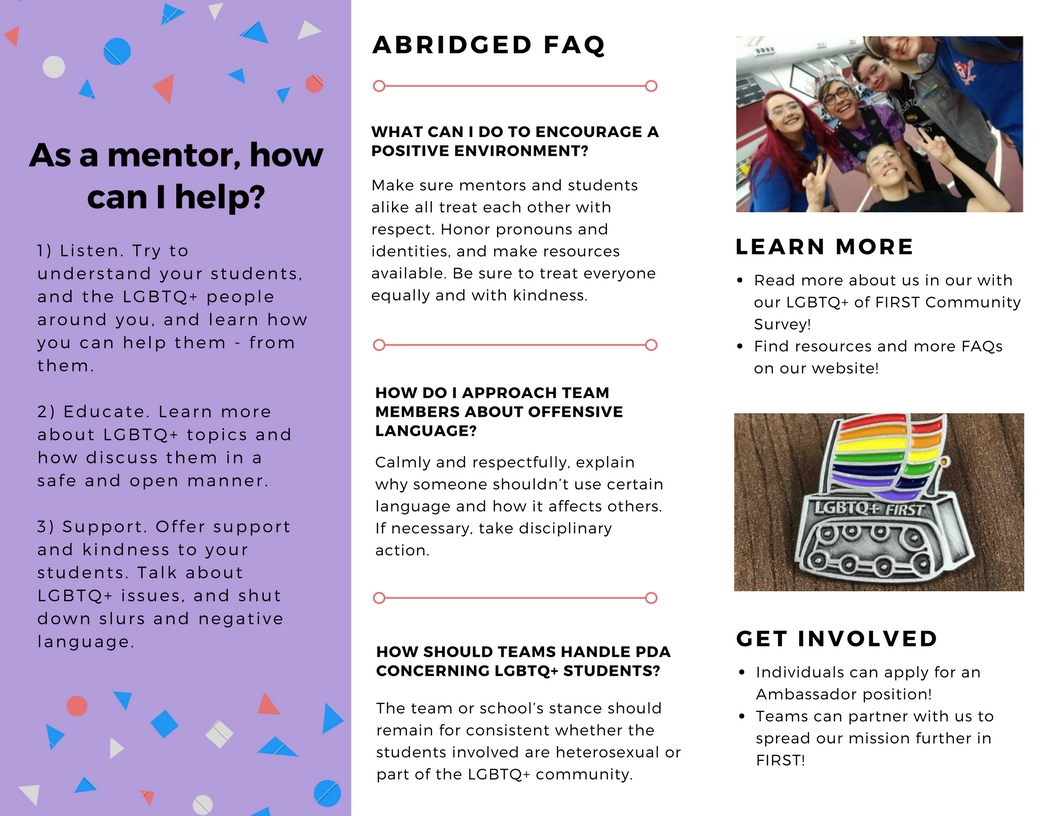
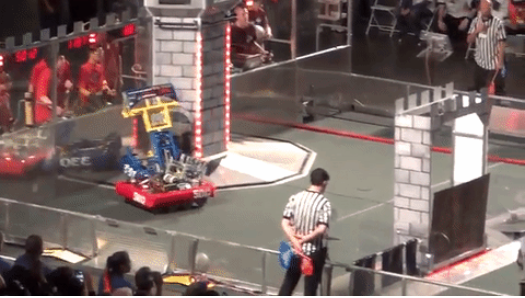
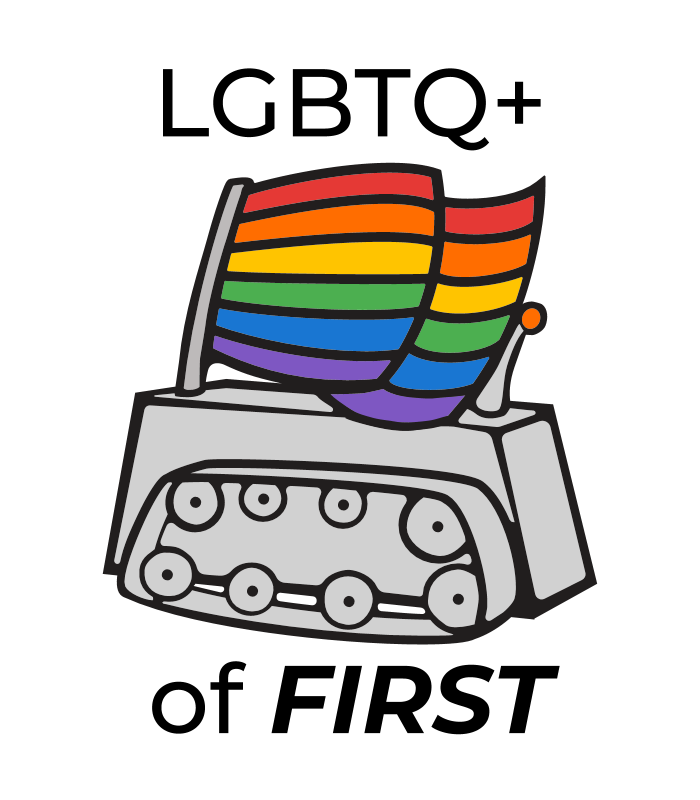
 RSS Feed
RSS Feed
